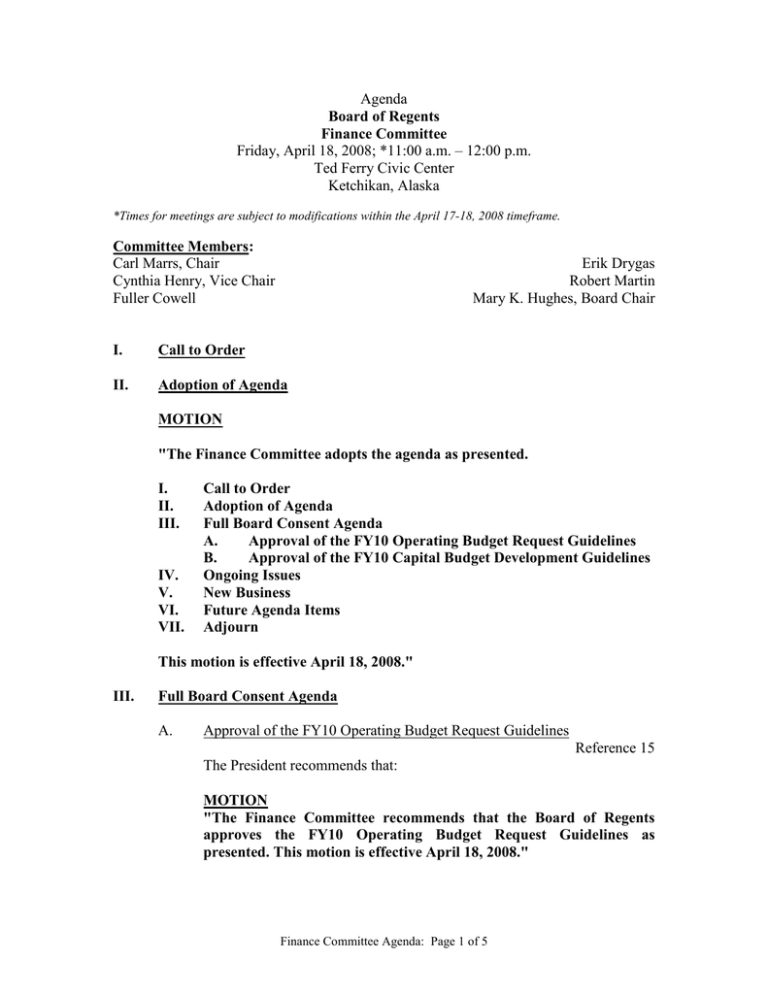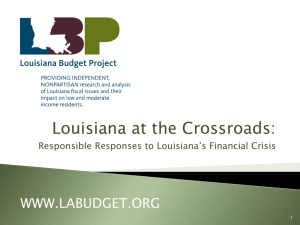Agenda Friday, April 18, 2008; *11:00 a.m. – 12:00 p.m. Ketchikan, Alaska
advertisement

Agenda Board of Regents Finance Committee Friday, April 18, 2008; *11:00 a.m. – 12:00 p.m. Ted Ferry Civic Center Ketchikan, Alaska *Times for meetings are subject to modifications within the April 17-18, 2008 timeframe. Committee Members: Carl Marrs, Chair Cynthia Henry, Vice Chair Fuller Cowell Erik Drygas Robert Martin Mary K. Hughes, Board Chair I. Call to Order II. Adoption of Agenda MOTION "The Finance Committee adopts the agenda as presented. I. II. III. IV. V. VI. VII. Call to Order Adoption of Agenda Full Board Consent Agenda A. Approval of the FY10 Operating Budget Request Guidelines B. Approval of the FY10 Capital Budget Development Guidelines Ongoing Issues New Business Future Agenda Items Adjourn This motion is effective April 18, 2008." III. Full Board Consent Agenda A. Approval of the FY10 Operating Budget Request Guidelines Reference 15 The President recommends that: MOTION "The Finance Committee recommends that the Board of Regents approves the FY10 Operating Budget Request Guidelines as presented. This motion is effective April 18, 2008." Finance Committee Agenda: Page 1 of 5 Agenda Finance Committee April 18, 2008 Ketchikan, Alaska POLICY CITATION Regents' Policy 05.01.01.A. – Budget Policy, states, "The budget of the University of Alaska represents an annual operating plan stated in fiscal terms." RATIONALE/RECOMMENDATION President Hamilton and Vice President Pitney will present the recommended FY10 Operating Budget Request Guidelines (Reference 15). The operating guidelines serve as a tool for the administration to prioritize budget requests and maintain alignment with the Board of Regents’ UA Strategic Plan 2009 goals and expected administrative efficiencies. The FY10 guidelines include integration of performance assessment and continued emphasis on accountability and transparency. The program enhancement priorities in the FY10 guidelines are similar to the FY09 guidelines with emphasis on three themes: Preparing Alaskans for the State’s high-demand jobs Enhancing research and taking advantage of UA’s research strengths in climate change, energy, and natural resources. Enhancing student success and college readiness In addition, within each of these three themes, there will be greater attention on strategies to align public service, outreach, and engagement efforts. The guidelines propose six statewide planning groups set up like the health and engineering planning groups in the FY09 budget development process. The recommended groups are: Health Engineering and Construction Career and Tech. Workforce (other) Teacher Education Student Success Research Below are some atmospheric issues that will be considered in the FY10 budget development process. State Funding Environment University Generated Funding Environment: o Student Related Revenue o Foundation and Fund Raising Related Revenue o Local and Private Partnerships o Federal Revenue Tuition Affordability and Student Access Finance Committee Agenda: Page 2 of 5 Agenda Finance Committee April 18, 2008 Ketchikan, Alaska Communications/Technology Industry Issues Risk Management/Insurance Costs New Facilities Coming On-line M&R, R&R, Operations and Existing Facility R&R Federal Research Issues – International Polar Year (IPY), Research Vessel, Climate, National Institute of Health (NIH) and National Science Foundation (NSF) Funding Increasingly Competitive Higher Education Environment Maintaining Momentum in Priority Workforce Programs Revenue assumptions are not approved as part of the guidelines and it is too early in the cycle for good budget estimates, however, the administration will develop the budget request using the following broad expectations: Enrollment will increase slightly as a result of FY08 and FY09 program investments. Externally funded research activity, after flat and declining levels in FY07-09, will begin increasing in FY10. Indirect Cost Recovery (ICR) will flatten or slightly decline due to the reduced ICR rate. University generated funds will increase 5 percent. Tuition rates will increase 5 percent. The FY10 request will include the recent union contract negotiations. In addition, a discussion on a different staff compensation structure for FY10 and beyond that maintains UA’s ability to recruit and retain qualified staff will occur. It is expected that the FY10 PERS and TRS retirement system employer contribution rates will remain at the FY09 levels (12.56% TRS, and 22.00% PERS). Employer health contributions on a per employee basis will remain the same as FY09. The Board of Regents will be involved in the following budget related items in the coming months. A complete budget development process calendar is included in the Budget Development Process Overview document as Reference 15. June Board of Regents FY09 Operating and Capital Budget Acceptance Board of Regents FY09 Operating and Capital Budget Distribution Plans Approval Finance Committee Agenda: Page 3 of 5 Agenda Finance Committee April 18, 2008 Ketchikan, Alaska September First Review of FY10 Operating and Capital Budget Discussion and Approval of Tuition Rates for Academic Year 2011 November Approve the FY10 Operating Budget Request Approve the FY10 Capital Budget Request Approve the FY10-FY15 Capital Plan Approve the FY09 Natural Resources Fund Budget Allocation Below are other key dates in the FY10 budget development process. July Initial meeting with the Governor’s Office of Management and Budget (OMB) to discuss FY10 program themes, fixed costs and capital budget needs August FY10 MAU Operating Budget Requests submitted to Statewide Planning and Budget including: extraordinary fixed cost increases, new facility operating costs, priority program descriptions, and incremental revenue estimates FY10 MAU Capital Budget Requests submitted to Statewide Planning and Budget including: capital budget requests, deferred maintenance lists, list of expected leased properties, and list of projects with potential debt financing needs FY10 budget meeting of the University of Alaska leadership to present and review MAU FY09 budget request priorities September Formal budget meeting with Governor’s Office of Management and Budget (OMB) October MAU Fall Financial Review including MAU Performance Assessment. November Submit Board of Regents’ FY10 Budget to the Governor’s Office of Management and Budget (OMB) Finance Committee Agenda: Page 4 of 5 Agenda Finance Committee April 18, 2008 Ketchikan, Alaska B. Approval of FY10 Capital Budget Development Guidelines Reference 16 The President recommends that: MOTION "The Finance Committee recommends that the Board of Regents approves the FY10 Capital Budget Development Guidelines as presented. This motion is effective April 18, 2008." POLICY CITATION Regents' Policy 05.01.01.A. – Budget Policy, states, "The budget of the University of Alaska represents an annual operating plan stated in fiscal terms." RATIONALE AND RECOMMENDATION The FY10 capital budget request guidelines are similar to the FY09 guidelines. These guidelines set forth the method and criteria by which capital projects are prioritized in the next year’s budget request. The guidelines are organized in the following sections: Background, Guiding Principles, General Development Process, Capital Project Categories, Capital Project Scoring Criteria, and Criteria Descriptions. During the April meeting, the administration expects to address criteria used to rank capital projects, the relative request level for capital projects, and strategic approaches to securing funding for UA’s renewal and replacement and deferred maintenance backlog. Vice President Pitney will discuss current capital budget activities, possible implications of recommendations from the RISE Consultants, and the capital budget guidelines recommendation. The FY10 capital budget request guidelines will be used by the administration to filter and prioritize competing budget requests. The Board of Regents' UA Strategic Plan 2009 is an integral component of both the operating and capital budget request guidelines. The proposed guidelines are included as Reference 16. IV. Ongoing Issues V. New Business VI. Future Agenda Items VII. Adjourn Finance Committee Agenda: Page 5 of 5


